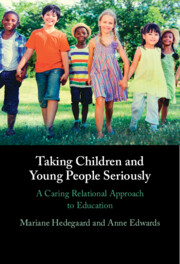Book contents
- Taking Children and Young People Seriously
- Taking Children and Young People Seriously
- Copyright page
- Contents
- Figures
- Tables
- Chapter 1 Taking Children and Young People Seriously
- Chapter 2 A Cultural-Historical Approach to Children’s Development and Childhood
- Chapter 3 Working Relationally with Other Professionals and Families
- Chapter 4 Very Young Children
- Chapter 5 Care and Education in Kindergarten with Play as the Core Activity
- Chapter 6 Engaging with Knowledge When Starting School
- Chapter 7 Caring Approaches to Pedagogy
- Chapter 8 The Primary School Age
- Chapter 9 Developmental Teaching as a Double Move between Subject Knowledge and Children’s Appropriation of Personal Knowledge
- Chapter 10 Adolescence and Transitions into Early Adulthood
- Chapter 11 A Caring Relational Approach to Education
- References
- Index
Chapter 9 - Developmental Teaching as a Double Move between Subject Knowledge and Children’s Appropriation of Personal Knowledge
Published online by Cambridge University Press: 08 June 2023
- Taking Children and Young People Seriously
- Taking Children and Young People Seriously
- Copyright page
- Contents
- Figures
- Tables
- Chapter 1 Taking Children and Young People Seriously
- Chapter 2 A Cultural-Historical Approach to Children’s Development and Childhood
- Chapter 3 Working Relationally with Other Professionals and Families
- Chapter 4 Very Young Children
- Chapter 5 Care and Education in Kindergarten with Play as the Core Activity
- Chapter 6 Engaging with Knowledge When Starting School
- Chapter 7 Caring Approaches to Pedagogy
- Chapter 8 The Primary School Age
- Chapter 9 Developmental Teaching as a Double Move between Subject Knowledge and Children’s Appropriation of Personal Knowledge
- Chapter 10 Adolescence and Transitions into Early Adulthood
- Chapter 11 A Caring Relational Approach to Education
- References
- Index
Summary
Developmental teaching has a long history starting with Vygotsky’s ideas of teaching reaching into the zone of proximal development, an accomplishment that only are possible with the help of qualified teachers. Developmental teaching is oriented both to children’s acquisition of competence and to their formation as persons acquiring theoretical thinking and motive orientation. Central ideas in developmental teaching are that general knowledge in the form of core relations should come before specific and concrete knowledge, and that children through agentic but also teacher-guided exploration should be able to acknowledge these conceptual relations. These ideas have been extended with Hedegaard’s ideas of the double move in teaching and learning. In this process, teaching is a double and moving back to qualify children’s… knowledge to subject matter knowledge and back to quality children’s concept formation. This is illustrated in a project focusing on the subjects of biology, human geography and history working with oppositions, using children’s everyday knowledge and questions to create their activities and motivation for exploration. The Radical-Local approach extends the double move with inclusion of aspects of children’s community as a process of movement from the local to the general and the general to the local. The chapter also addresses assessment challenges through presenting a questionnaire addressing the child’s social situation of development, to capture the child’s perspective on their participation in school practices.
Keywords
- Type
- Chapter
- Information
- Taking Children and Young People SeriouslyA Caring Relational Approach to Education, pp. 202 - 235Publisher: Cambridge University PressPrint publication year: 2023



